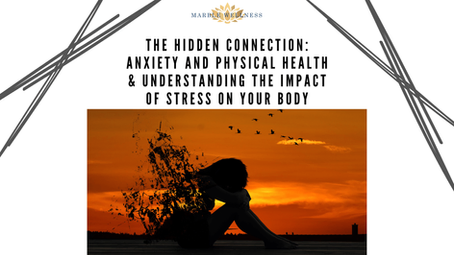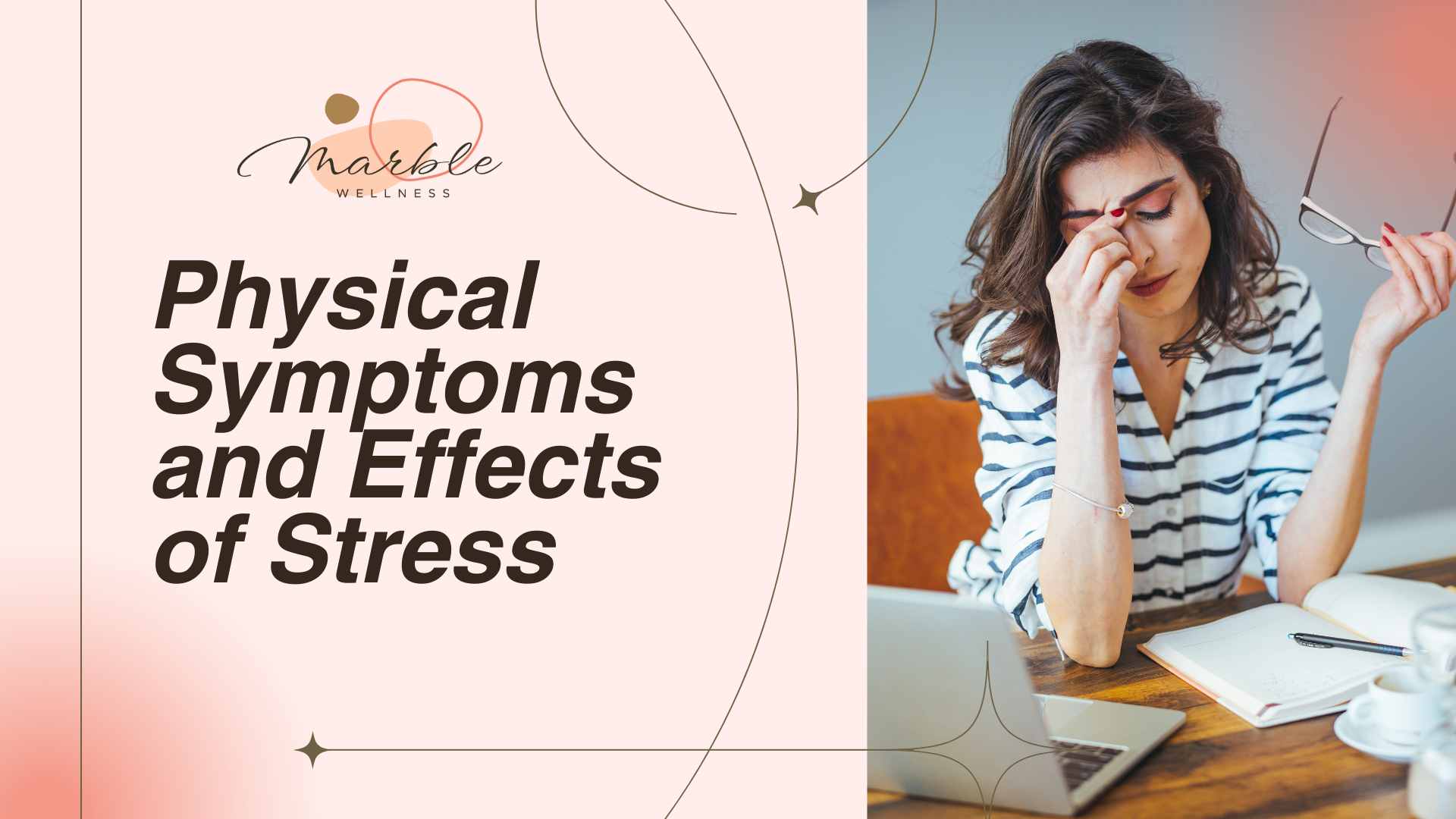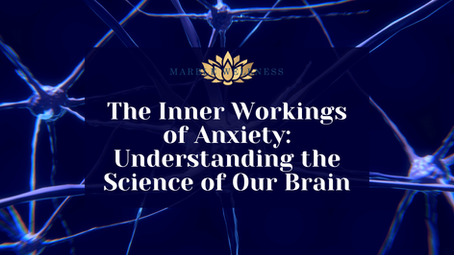Do you often find yourself feeling anxious and stressed out? Have you noticed physical symptoms like:
- headaches,
- muscle tension
- digestive issues accompanying your anxiety?
It’s important to recognize that anxiety doesn’t just affect your mental well-being; it can also have a significant impact on your physical health. Here at Marble Wellness in St. Louis, MO we take a whole mind-body approach to the treatment of anxiety.

The Hidden Connection Between Physical Health and Anxiety
In this article, we will explore the hidden connection between anxiety and physical health. We will also begin shedding light on the impact of stress on your body. By understanding the mind-body connection, you’ll gain valuable insight into how stress affects your health. Plus, you will discover practical tips to manage anxiety and improve your physical well-being. Let’s delve into the secrets of this powerful connection!
The Impact of Stress on Your Body:
Stress and anxiety can have far-reaching effects on your physical health, impacting various systems and organs in the body. Understanding how stress manifests in different areas can help you recognize the importance of managing stress. Here are more in-depth insights into the impact of stress on specific bodily systems:
Cardiovascular System:
Chronic stress can significantly impact the cardiovascular system, increasing the risk of developing heart problems and cardiovascular diseases. When you experience stress, your body releases stress hormones like cortisol and adrenaline, which can temporarily raise blood pressure and heart rate. Over time, persistent elevation of these levels can lead to hypertension (high blood pressure) and contribute to the development of heart disease. Additionally, stress can promote inflammation and oxidative stress, damaging blood vessels and leading to atherosclerosis (hardening of the arteries). Therefore leading to an increased risk of heart attacks and strokes.
Immune System:
Prolonged stress weakens the immune system, making you more vulnerable to infections and illnesses. When stress hormones are constantly released, they can suppress the immune response, impairing the ability of immune cells to fight off pathogens. As a result, you may experience more frequent infections, longer recovery times, and a higher susceptibility to diseases. Chronic stress has also been linked to increased inflammation in the body, which can contribute to a wide range of health problems, including autoimmune disorders, allergies, and chronic inflammatory conditions.
Digestive System:
Stress can disrupt the normal functioning of the digestive system, leading to a variety of gastrointestinal symptoms and disorders. When stressed, your body’s “fight-or-flight” response is activated, diverting resources away from non-essential functions like digestion. This can result in symptoms such as stomachaches, bloating, constipation, or diarrhea.
Chronic stress has been associated with the development or exacerbation of digestive disorders like:
- irritable bowel syndrome (IBS)
- inflammatory bowel disease (IBD)
- gastroesophageal reflux disease (GERD)
It can also affect the balance of gut bacteria, impacting digestion and overall gut health.
Musculoskeletal System:
Tension and stress can have a significant impact on the musculoskeletal system, causing muscle stiffness, tension headaches, and chronic pain conditions. When stressed, your muscles can become tense and tight, leading to discomfort and pain. Chronic stress can contribute to the development of conditions like fibromyalgia, characterized by widespread pain, fatigue, and heightened sensitivity to touch. Additionally, stress can exacerbate existing musculoskeletal conditions such as back pain, neck pain, and temporomandibular joint (TMJ) disorders, leading to increased discomfort and reduced quality of life.
Respiratory System:
Stress can affect your breathing patterns and respiratory health. When stressed, your body’s natural response is to increase oxygen intake, leading to rapid, shallow breathing or hyperventilation. This can disrupt the balance of carbon dioxide and oxygen in the body, potentially triggering symptoms in individuals with respiratory conditions such as asthma or chronic obstructive pulmonary disease (COPD). For those with asthma, stress can worsen symptoms and increase the frequency and severity of asthma attacks. In individuals with COPD, stress can exacerbate breathing difficulties and decrease lung function.
Managing Anxiety and Improving Physical Health:
Now that we understand the impact of stress on the body, let’s explore practical strategies to manage anxiety and improve your physical well-being:
Stress Management Techniques:
Exercise:
Engaging in regular physical activity not only helps reduce stress but also releases endorphins, which are natural mood boosters. Choose activities that you enjoy, such as walking, running, dancing, or swimming, and aim for at least 30 minutes of exercise most days of the week.
Yoga and Meditation:
These practices combine physical movement, breath control, and mindfulness to promote relaxation and reduce anxiety. Join a yoga class or use online resources to learn different poses and meditation techniques that suit your needs.
Deep Breathing Exercises:
Deep breathing exercises, such as diaphragmatic breathing or box breathing, can activate the body’s relaxation response. Practice these techniques regularly to calm your mind and regulate your breathing during times of stress.
Mindfulness-Based Stress Reduction (MBSR):
MBSR is a program that combines mindfulness meditation, gentle yoga, and awareness of the present moment. It helps cultivate a non-judgmental attitude, reduces stress, and promotes overall well-being.
Healthy Lifestyle:
Balanced Diet:
Focus on consuming a well-rounded diet that includes whole grains, lean proteins, fruits, vegetables, and healthy fats. Avoid excessive consumption of processed foods, refined sugars, and high-fat meals, as they can negatively impact mood and energy levels.
Hydration:
Proper hydration is essential for physical and mental well-being. Aim to drink an adequate amount of water throughout the day to stay hydrated and support optimal bodily functions.
Quality Sleep:
Establish a consistent sleep routine that allows for sufficient rest. Create a sleep-friendly environment by keeping your bedroom cool, dark, and quiet. Limit screen time before bed and engage in relaxing activities to promote a restful night’s sleep.
Substance Limitation:
Be mindful of substances that can exacerbate anxiety symptoms, such as alcohol, caffeine, and nicotine. While these substances may provide temporary relief, they can increase anxiety levels in the long run. Consider reducing or eliminating their consumption.
Seek Support:
Friends and Family:
Reach out to your loved ones and share your feelings and concerns with them. Opening up to trusted individuals can provide emotional support and help alleviate anxiety.
Therapy:
Consider seeking the guidance of a mental health professional who specializes in anxiety disorders. Therapy, such as cognitive-behavioral therapy (CBT), can help you identify and challenge negative thought patterns, develop coping skills, and navigate anxiety triggers.
Support Groups:
Connect with others who are experiencing similar challenges by joining support groups or online communities. Sharing experiences, insights, and coping strategies can create a sense of belonging and provide additional support on your journey.
Time Management and Prioritization:
Establish Priorities:
Identify tasks or responsibilities that are most important and allocate your time accordingly. Break tasks into smaller, manageable steps to prevent feeling overwhelmed.
Time Blocking:
Create a schedule that includes dedicated time for work, relaxation, self-care, and activities you enjoy. Setting boundaries and adhering to a structured routine can help reduce stress and promote a sense of control over your time.
Delegate and Ask for Help:
Recognize when you need assistance and be willing to delegate tasks or ask for support. It’s important to remember that you don’t have to manage everything on your own.
Self-Care:
Engage in Activities You Enjoy:
Set aside time each day for activities that bring you joy and relaxation. Whether it’s reading, painting, gardening, listening to music, practicing a hobby, or visiting an art museum engaging in pleasurable activities helps reduce stress and promote a sense of fulfillment.
Nature Connection:
Spend time in nature to reconnect with its calming and restorative effects. Visit parks, gardens, or nearby natural areas to immerse yourself in the beauty of the outdoors. Engaging in activities like walking, hiking, or picnicking can further enhance the benefits of being in nature.
Mindful Self-Care:
Practice self-compassion and self-acceptance by treating yourself with kindness and understanding. Engage in mindfulness activities such as journaling, gratitude exercises, or body scans to cultivate a deeper sense of self-awareness and appreciation.
Learn More About the Mind-Body Connection in Therapy for Anxiety in St. Louis, MO
Understanding the hidden connection between anxiety and physical health is crucial for promoting overall well-being. Stress and anxiety can impact various bodily systems, leading to a range of health problems. By implementing practical strategies to manage anxiety and improve physical health, such as stress management techniques, a healthy lifestyle, seeking support, time management, and self-care, you can take proactive steps toward enhancing your well-being.
At Marble Wellness in St. Louis, MO, we are here to empower, support, and collaborate with you on your journey to optimal mental and physical health. Remember, by addressing anxiety and managing stress, you can pave the way for a healthier, happier life.
Our Client & Project Coordinator will be your first point of contact. She’ll get you set up with a good match for you on our team, and talk first appointment details.
Meet with one of our Anxiety Therapists:
All of the members of our team are trained in and skilled at treating anxiety. They will work with you to personalize a plan to cope with and reduce your anxiety.
Start to overcome your anxiety:
Whether it’s in-person, online, or park therapy, you and your therapist will use their skills and strengths to help you start to live a life free from anxiety.
Other Mental Health Services at Marble Wellness
At Marble Wellness, our goal is simple: Counseling services are designed to help set you on a path of living a more fulfilled, calm, and happy life. We specialize in anxiety, depression, grief, chronic illness, therapy for men, couples, and maternal overwhelm. We can also help new moms with various postpartum concerns, moms in the thick of parenting, and moms with teens. In addition to in-person options, we can also chat from wherever you are in the state with online therapy in Missouri and online therapy in Illinois. No matter where you are in your journey, we would love to support you.




